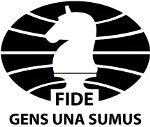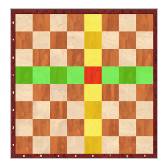The school, forger of new citizens
by Dr. Uvencio Blanco Hernández

Chess lesson in a Guyana school, 2023
School promotes values
In order to come closer to an adequate answer, we would then have to ask ourselves other questions; among them, what are the aims of education? It is pertinent to ask this question because we are interested in reinforcing or discovering the links between chess, as an educational tool, and the vast domain in which it will be applied: education. It is therefore important to clarify this relationship, understanding that, in principle, the school is an institution which trains future citizens, an action which it does not carry out alone, but which it shares with the home because it stimulates and reinforces this training.
This implies a process of making conscious the existence of new knowledge, ideas and experiences. Then, to bring them to the mind in which critical judgements, actions and decisions to be taken will be elaborated, in favour of a greater well-being of the individual. But, above all, the exercise of education transmits and strengthens values, including study, work, tolerance, responsibility, wisdom and truth, among others. This aim, related to the formation of values, is so important that all the constitutions of the world contemplate it. For example, Article 3 of the Constitution of the Republic of Argentina states:
“Education is a national priority and constitutes a State policy for building a just society, reaffirming sovereignty and national identity, deepening the exercise of democratic citizenship, respecting human rights and fundamental freedoms, and strengthening economic development”.
For its part, the Constitution of the Kingdom of Spain, in Article 27, institutes:
“Everyone has the right to education and freedom of teaching is recognised education shall be aimed at the full development of the human personality in respect for the democratic principles of coexistence and fundamental rights and freedoms the public authorities guarantee the right of parents for their children to receive the religious and moral training that is in accordance with their own convictions basic education is compulsory and free the public authorities guarantee the right of all to education, through a general programming of education, with effective participation of all sectors…”
Education systems that do not teach people to think
And so, in general, words more or words less, the different charters insist on the same contents: democracy, rights, values, freedom of thought, etc. However, when we turn to the facts, we can see that some education systems are not educating children capable of facing the challenges of society at the beginning of the 21st century. These systems are producing schoolchildren who rarely use critical thinking skills to solve academic, real-world OR everyday problems.
In this regard, it is worth remembering that more than 250 years ago, Benjamin Franklin, one of the founding fathers of the American Union, stated that “Many valuable qualities of mind can be acquired and strengthened by chess”. Therefore, there are authors who propose that curricula should be revised to enable schoolchildren to “learn to think”. They do so on the basis that the game of chess is an appropriate pedagogical strategy, which can stimulate critical thinking in schoolchildren on a sustained basis.
When we speak of critical thinking, we are referring – precisely – to one of the most valued skills in education. In general terms, “critical thinking” implies the exercise of permanent doubt and questioning; of expressing uncertainty about judgements, dogmas, stereotypes, assertions and absolute axioms, which are present in our environment such as, for example, stereotypes and so-called “fake news”.
With a critical stance, the individual tries to have a justified idea of reality and not to blindly accept what others tell him or her or what he or she is informed about.
It is for this and other qualities that critical thinking is a widely accepted educational objective in most educational systems. It is based on respect for human dignity, autonomy and the preparation of students for successful citizenship.
In the work “Instructional System of Chess” (1995), we stated that the entry of chess in school was justified because, among other criteria, chess,
“.. stimulates the development of cognitive skills such as: attention, memory, intelligence, logical-mathematical thinking, critical thinking, etc., fundamental capacities for the further evolution of the individual”.
Source:
B lanco, U. (1995). Sistema instruccional de ajedrez
Blanco, U. (1995). ¿Por qué el ajedrez en las escuelas?


